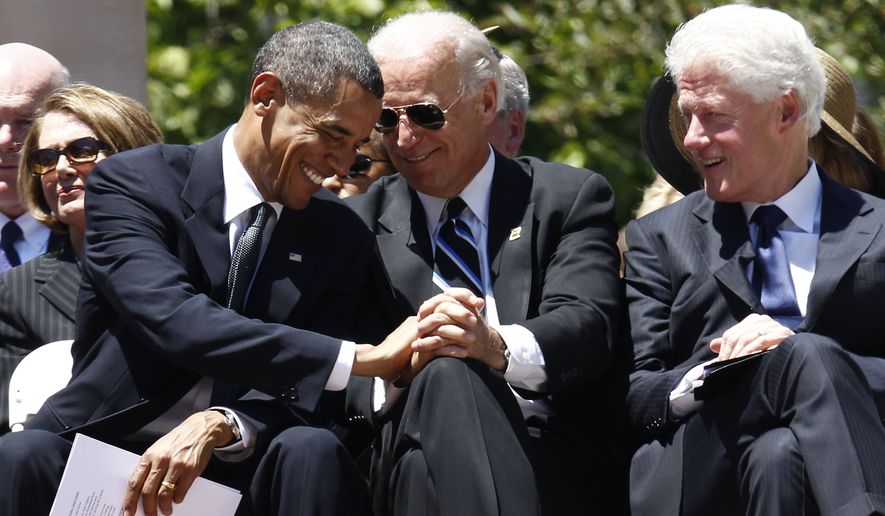A former White House official in the administration of President Bill Clinton was among the 39 U.S. officials and Obama administration appointees who, in 2016, sought the identity of an American caught in foreign signals intelligence reports later revealed to be retired Lt. Gen. Michael Flynn.
The former official, Robert G. Bell, asked the National Security Agency on Dec. 15, 2016 — a month and half after Donald Trump’s election as president — to unmask the identity of the unidentified American captured in a sensitive NSA intelligence report at the time.
Mr. Bell’s action was revealed in recent days as part of current acting Director of National Intelligence Richard Grenell’s move last week to declassify and share with U.S. lawmakers the list of 39 former officials who requested the intelligence reports that unmasked Flynn.
The list includes a host of high-profile figures, including former Vice President Joseph R. Biden.
Mr. Bell, meanwhile, was serving at the time as the representative of then-Defense Secretary Ash Carter to the North Atlantic Treaty Organization (NATO), a position he left in 2017.
In that position, Mr. Bell was in charge of planning, recommending and coordinating Pentagon policies and initiatives in Europe. He also supplied policies to the U.S. ambassador to NATO.
In addition to Mr. Bell, a total of eight other NATO officials sought the unmasking of an American or Americans listed in NSA intelligence reports on Dec. 15 and 16.
They included the then-U.S. representative to NATO Douglas Lute, and the then-U.S. representative to the NATO military committee, Vice Adm. John Christensen.
No details of the intelligence intercept containing Flynn’s name were disclosed in the document made public this week by Mr. Grenell.
However, the timing of the NATO officials’ unmasking requests suggest the intelligence report in question may have involved a conversation between Flynn and then-Russian Ambassador to the United States Sergei Kislyak.
The two were in frequent contact by phone and text after the Nov. 8 election in 2016, discussing Flynn’s pending appointment as President Trump’s national security adviser.
The NATO unmasking requests were made just days before Flynn’s appointment to the White House post was announced on Dec. 17, 2016.
Then-FBI Director James Comey, also sought Flynn’s identity from NSA on Dec. 15.
Mr. Comey has stated publicly that he dispatched two FBI agents to the White House without following normal procedures for investigating officials.
The two FBI agents interviewed Flynn and later charged him with lying to the FBI about his conversation with then-Russian Ambassador Kislyak.
That investigation and charges brought by Special Prosecutor Robert Mueller were later determined by the Justice Department to have been improper and the department last week filed a court motion to dismiss the case against Flynn.
U.S. District Court Judge Emmet Sullivan, however, in an unusual move, said he would not dismiss the case and asked a retired federal judge to argue in favor of keeping the case and possibly charging Flynn with perjury, apparently for admitting to investigators under oath that he lied to the FBI as part of a plea bargain that involved threats to take legal action against Flynn’s son.
Mr. Bell is currently chief executive officer of National Security Counsel, a consulting firm based in Florida. He did not respond to email and phone requests for comment.
From 1993 to 1999, Mr. Bell worked for the National Security Council staff as a special assistant to then-President Clinton for defense policy and arms control.
During the Clinton administration, Mr. Bell was controversial for his positions on arms control issues, including insisting that the United States limit its missile defenses under a narrow interpretation of the 1972 Anti-Ballistic Missile Treaty.
Mr. Bell authored a 1993 presidential memorandum that effectively killed work on developing a national missile defense system that he and other arms control advocates considered destabilizing.
He also drafted the 1993 Presidential Decision Directive/NSC-17 that called for sharing both missile warning data and ballistic missile defense technology with Russia, a policy opposed by the Pentagon.
The ABM treaty was rejected by the George W. Bush administration as limiting needed U.S. defenses against long-range missiles.
Mr. Bell also proposed sharing satellite laser test data with Moscow that critics in the Pentagon and the Air Force Space Command said would expose critical vulnerabilities of U.S. communications and intelligence satellites.
• Bill Gertz can be reached at bgertz@washingtontimes.com.




Please read our comment policy before commenting.